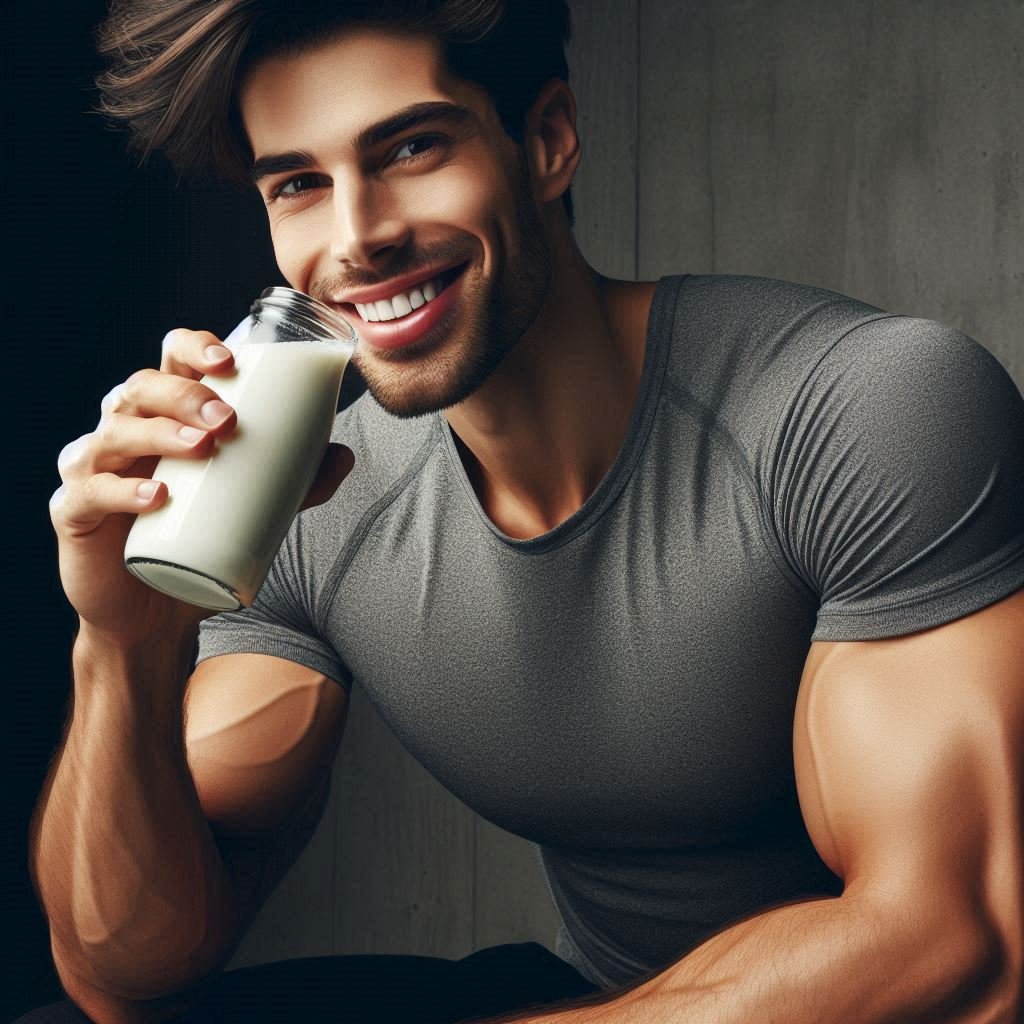
Is Milk Bad For Testosterone?
Milk has long been a dietary staple, praised for its rich content of calcium, protein, and essential vitamins. However, with growing concerns over hormonal health, particularly in men, questions arise about whether milk might negatively impact testosterone levels. In this blog post, See the relationship between milk consumption and testosterone to determine whether milk is bad for testosterone or not.
In this blog post, we’ll explore whether is milk bad for testosterone, or is milk bad for testosterone levels, or is milk bad for testosterone production, or is drinking milk bad for testosterone…
1. The Nutritional Profile Of Milk

Milk is a rich source of essential nutrients, including calcium for bone health, high-quality protein for muscle repair and growth, vitamin D for immune function and calcium absorption, and B vitamins for energy production. These nutrients make milk a valuable addition to a balanced diet, supporting overall health and well-being.
a. Nutritional Chart
The nutritional profile of a standard serving of milk (1 cup or 240 mL) for different types of milk:
| Nutrient | Whole Milk (3.25% fat) | 2% Milk (Reduced Fat) | 1% Milk (Low Fat) | Skim Milk (Non-fat) |
|---|---|---|---|---|
| Calories | 149 kcal | 122 kcal | 102 kcal | 83 kcal |
| Total Fat | 8.0 g | 4.8 g | 2.4 g | 0.2 g |
| Saturated Fat | 4.6 g | 3.1 g | 1.5 g | 0.1 g |
| Cholesterol | 24 mg | 20 mg | 12 mg | 5 mg |
| Protein | 7.7 g | 8.1 g | 8.2 g | 8.3 g |
| Carbohydrates | 11.7 g | 11.7 g | 12.2 g | 12.3 g |
| Sugars | 12.3 g | 12.3 g | 12.4 g | 12.5 g |
| Calcium | 276 mg | 293 mg | 305 mg | 316 mg |
| Vitamin D | 98 IU | 120 IU | 127 IU | 125 IU |
| Potassium | 322 mg | 342 mg | 366 mg | 382 mg |
| Vitamin B12 | 1.1 µg | 1.2 µg | 1.3 µg | 1.3 µg |
| Sodium | 98 mg | 100 mg | 107 mg | 127 mg |
This nutritional chart gives a quick overview of the key nutrients found in different types of milks helping you understand their benefits and how they fit into your overall diet.
2. The Debate Of Milk And Testosterone

The concern about milk affecting testosterone levels typically stems from the presence of natural hormones in milk and the impact of certain dairy processing methods. Here are the primary points of contention:
a. Hormones In Milk
Milk naturally contains small amounts of hormones like estrogen and progesterone, as it comes from lactating cows. Some worry that these hormones could interfere with testosterone production. However, the levels of these hormones in milk are relatively low, and there is limited evidence to suggest they significantly affect human testosterone levels when consumed in moderate amounts.
b. IGF-1 Levels
Milk consumption has been shown to increase levels of Insulin-like Growth Factor 1 (IGF-1) in the body, a hormone linked to growth and development. While IGF-1 has been associated with muscle growth, some studies suggest high levels might influence testosterone by increasing the conversion of testosterone to estrogen. However, the impact of this on overall testosterone levels remains unclear.
c. Dairy And Diet Quality
Some research suggests that high dairy consumption could be associated with lower testosterone levels, but this is often in the context of a diet high in processed foods, which could be a confounding factor. A balanced diet that includes dairy in moderation may not have the same effect.
3. Research And Evidence About Milk

Studies on the impact of milk on testosterone levels have produced mixed results. Some research suggests that high dairy consumption might be linked to lower testosterone levels, particularly in diets high in processed foods, which could influence these findings. However, these studies often lack consistency and fail to establish a direct causal relationship.
On the other hand, some studies have found no significant effect of moderate milk consumption on testosterone levels. The differences in results often depend on variables such as overall diet quality, lifestyle factors, and the type of milk consumed (full-fat vs. low-fat). Overall, the evidence is not conclusive enough to definitively state that milk is harmful to testosterone levels.
4. How To Incorporate Milk Into A Balanced Diet

Milk can still be part of a healthy diet without necessarily harming testosterone levels. Here are some tips:
Choose the Right Type: Opt for organic or hormone-free milk if you’re concerned about hormone content. Full-fat milk might be preferable in moderation, as low-fat versions can contain added sugars, which may negatively affect hormonal health.
Moderation Matters: As with any food, consuming milk in moderation is key. Excessive dairy intake, especially from processed sources, might have more of an impact than moderate consumption as part of a balanced diet.
Focus on Whole Foods: Ensure your diet includes a variety of whole foods, including lean proteins, fruits, vegetables, and healthy fats, to support overall hormonal balance.
5. Conclusion

In conclusion, is milk bad for testosterone? The answer isn’t straightforward. While some concerns about milk’s potential impact on testosterone exist, particularly regarding its natural hormone content and the effects of IGF-1, the evidence is not conclusive. For most people, consuming milk in moderation as part of a balanced diet is unlikely to cause significant changes in testosterone levels.
If maintaining optimal testosterone levels is a priority for you, focus on a holistic approach to diet and lifestyle. This includes regular exercise, adequate sleep, stress management, and a diet rich in diverse, whole foods. Milk can be a part of that diet, offering valuable nutrients without necessarily compromising your hormonal health.
So You have gotten all the answers about whether is milk bad for testosterone, or is milk bad for testosterone levels, or is milk bad for testosterone production, or is drinking milk bad for testosterone, or is whole milk bad for testosterone…
Like This Also Read- Are Bananas Bad For Testosterone? A Complete Guide










